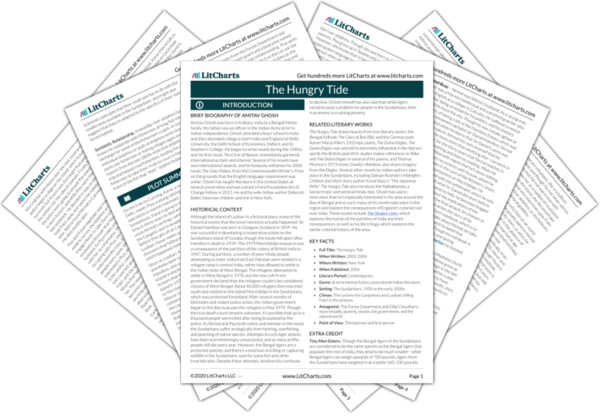In the Sundarbans, tigers symbolize the extraordinary power of the natural world. Locals know that the tigers are always there and can appear and kill with no notice, and they overwhelmingly believe that to even say the word "tiger" is to call the beast itself. Though tigers certainly aren't the only animal or natural force capable of killing people, the special reverence afforded to tigers makes them the representative of the deadliness of the Sundarbans as a whole. Like the tigers, the landscape itself must be treated with respect, reverence, and fear.
Tigers Quotes in The Hungry Tide
But for these women the imagining of early widowhood was not a wasted effort: the hazards of life in the tide country were so great; so many perished in their youth, men especially, that almost without exception the fate that they had prepared themselves for did indeed befall them.
"Who are these people, I wondered, who love animals so much that they are willing to kill us for them […] it seemed to me that this whole world had become a place of animals, and our fault, our crime, was that we were human beings, trying to live as human beings always have, from the water and the soil."
"Because it was people like you," said Kanai, "who made a push to protect the wildlife here, without regard for the human costs. And I'm complicit because people like me […] have chosen to hide these costs, basically in order to curry favor with their Western patrons. It's not hard to ignore the people who're dying—after all, they are the poorest of the poor."
[…] He had become a token for a vision of human beings in which a man like Fokir counted for nothing, a man whose value was less than an animal. In seeing himself in this way, it seemed perfectly comprehensible to Kanai why Fokir should want him dead—but he understood also that this was not how it would be. Fokir had brought him here not because he wanted him to die, but because he wanted him to be judged.
Wasn't this why people who lived in close proximity with tigers so often regarded them as being something more than just animals? Because the tiger was the only animal that forgave you for being so ill at ease in your translated world?
The words he had been searching for, the euphemisms that were the source of his panic, had been replaced by the thing itself, except that without words it could not be apprehended or understood. It was an artifact of pure intuition, so real that the thing itself could not have dreamed of existing so intensely.












